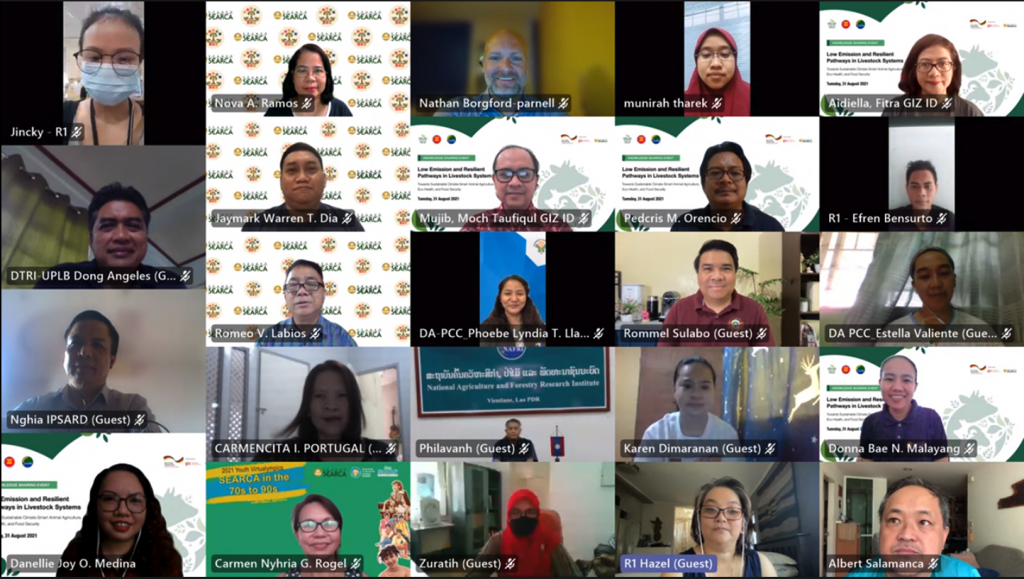
The livestock sector contributes to countries’ incomes and livelihoods, assets, nutrition and food security. Across ASEAN Member States, and particularly in least-developed countries, livestock husbandry by small farmers helps alleviate poverty and boost food security and gender equality (Strategic Plan of Action for ASEAN Cooperation in Livestock, 2016-2020). However, the sector is also widely recognised to be a contributor to global greenhouse gas (GHG) emissions, while improper management of livestock waste is also identified as one of the largest contributors to water pollution, while farming generates potential pathogens and animal diseases that can pose risks to public health.
To further explore these interconnected challenges and opportunities in a comprehensive, science-based and innovative way, the National Agriculture and Forestry Research Institute (NAFRI) of the Lao PDR and the ASEAN Climate Resilience Network (ASEAN-CRN) jointly organised a knowledge sharing event.
The event, entitled Low-emission and resilient pathways in livestock systems: towards sustainable, climate-smart animal husbandry, eco-health and food security, was held online on 31 August 2021. It brought together some 80 participants joining in the virtual meeting room and live broadcast of SEARCA’s platform.
Interconnectedness of livestock, climate change and NDCs
In his introductory remarks, Dr Viengsavanh Phimphachanhvongsod from NAFRI, highlighted the importance of regional knowledge exchange and sharing in climate change adaptation and mitigation measures in the Southeast Asia region. He cited best practice from ASEAN-CRN. As a platform for regional exchange, ASEAN-CRN has been hosting technical exchange events to share information, experiences and expertise on climate-smart agriculture (CSA) in the region.
These technical events, organised during the pandemic, reflect on the impacts of and responses to the COVID-19 pandemic. This is in line with the ASEAN Comprehensive Recovery Framework (ACRF), the policy reference framework for strategic recovery and sustainable development in the region.
Moving on to consider this topic in greater detail, the presentation by Dr Rommel C Sulabo of the Institute of Animal Science, University of the Philippines Los Baños (UPLB), entitled Climate Change, Livestock Production and Food Security in Southeast Asia, considered interlinkages between these sectors. The presentation highlighted the importance of climate change adaptation and mitigation practices supported by relevant new technologies and policy frameworks to balance the needs of sustainable livestock production and environmental sustainability.
In his presentation, Enhancing Nationally Determined Contributions (NDCs): Opportunities for the Livestock Sector in Southeast Asia, Dr Nathan Borgford-Parnell of the Climate & Clean Air Coalition (CCAC) provided a detailed explanation of methane emissions resulting from human actions and industry and the urgency of addressing this challenge in the context of global warming.
He pointed to NDCs as a crucial mechanism for expressing a country’s objectives of mitigating climate change and including methane emission reductions targets. He also cited examples of best practice from Cambodia and Viet Nam, which have included livestock sector methane mitigation measures in their NDCs. He went on to highlight the importance of including all mitigation measures that fully align NDCs with other strategies quantifying and communicating the multi-benefits of actions, such as climate, health, agriculture and other development objectives.
Dr Tran Dai Nghia of the Vietnamese Institute of Policy and Strategy for Agriculture and Rural Development (IPSARD) presented best practice in a presentation entitled Sustainable Livestock Production in Viet Nam: Country Experiences. His presentation provided an overview of livestock production in Viet Nam and outlined the country’s strategy for reducing GHG emissions in its NDCs, such as its National Adaptation Plan (NAP), which applies selection criteria to policy priorities in agriculture planning and other frameworks.
The knowledge exchange is facilitated by the Climate-Smart Land Use (CSLU) in ASEAN project, with funding from the German Federal Ministry for Economic Cooperation and Development (BMZ) and implemented by the Deutsche Gesellschaft für Internationale Zusammenarbeit (GIZ) GmbH, and jointly organised with the Southeast Asian Regional Center for Graduate Study and Research in Agriculture (SEARCA).
Documentation and the presentations made during the knowledge exchange event are available at: Event Documentation Low Emission and Resilient Pathways in Livestock Systems